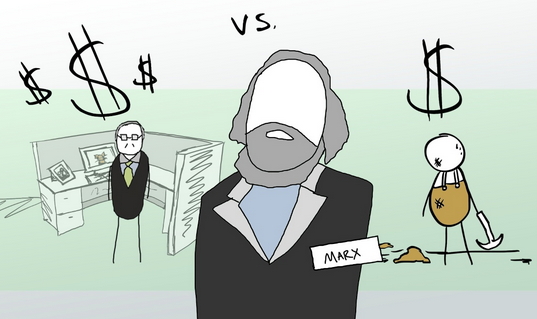Karl Marx was a German philosopher, economist, sociologist, journalist and revolutionary socialist. He published numerous books, the most notable being Das Kapital and The Communist Manifesto. He also put forward his views on Economics.
Economics is the branch of knowledge concerned with the production, consumption, and transfer of wealth. Economics can also be defined as a social science subject which focuses on the production, distribution and consumption of goods and services in a country or world.
Marx predicted things almost two centuries before those things actually happened. His work in economics laid the basis for much of the present understanding of labour and its relation to capital and subsequent economic thought.
Karl Marx was a socialist. He believed in socialism. He believed that capitalism is doomed and will cease to exist. His work has had an everlasting impact on the arena of sociology in that his views and its interpretations opened the door to the study of how one’s social class has a direct influence on one’s life experiences and life chances and a plethora of perspectives on the issue of the wealthy and the poor in society.
According to Marx, the society was essentially divided into two classes, the upper/capitalist class and the lower/labour class. The capitalist class was also the bourgeoisie and the labour class was the proletariat. There was one social element on the basis of which it was decided where one would fit in the social class hierarchy – that of one who owns the means of production. Means of production were resources necessary to produce what people needed to survive such as facilities, machinery, tools, infrastructural capital and natural capital. Bourgeoisie, who were in minority, owed most (if not all) of the means of production and proletariat, who were in majority, owned an insignificant (if at all) share of means of production.
The wealthy would be the ones who owned land and factories and controlled all elements of society, including the livelihood of the labour class. The labour class owned nothing but their own labour that they would sell, for wages, on the land or in factories.
Marx gave answer to the most basic question – how can there be poverty on such a large scale in a world where there was an abundance of wealth. His answer was simple: capitalism.
In order to trace the outlines of capitalism, it is necessary to first say a few words about history – feudalism. It was a feudal hierarchy, in which the serf was protected by the lord of the manor, who in turn owed allegiance to a higher overlord. The system finally ended with the king. The stronger protected the weak, and charged a very high price. The hierarchy was based on a system of mutual obligations and services. The lord was obliged to protect the serf and serf was to perform extensive labour for the lord. Serf could not be parted from either his/her family or land. They were exploited in the extreme.
The Catholic Church was the supreme power and the largest owner of land during the Middle Ages. Religious lords had a primary loyalty to the church in Rome. The teachings of church had a very strong and pervasive influence throughout Europe. Serfs were living on bare minimum amount and they did not revolt for a very long time because the church said that it’s a sin to keep any extra amount and that all the surplus should be given to the king or the church.
With the onset of industrial revolution, Marx thought that now the working poor will rise financially and socially. However, this did not materialize.
In the industrial society, the lords and overlords were replaced by the bourgeoisie who owned businesses and were driven with the goal of earning profit. The serfs were replaced by the proletariat who laboured for wages.
According to Marx, this system was inherently unfair. He believed that the workers would become poorer and poorer and will be faced with the feeling of alienation. They will become more distanced from, or isolated from, their work and feel powerless. To replace this feeling of alienation and this extreme social class structure, capitalism had to end and be replaced by a socialist system where everyone had equal rights over the means of production and people’s needs were met.
In his work with Fredrick Engels, The Communist Manifesto, Marx stated, ‘The proletarians have nothing to lose but their chains. They have a world to win.’
Therefore, Marx had called for a workers’ revolution where proletarians would rise up against bourgeoisie and overthrow them. This will ultimately lead to the end of capitalism and rise of a new social structure, socialist system. Such revolutions did occur in various countries such as Russia and China, but did not occur in the more industrialized nations, like Britain and Germany.



